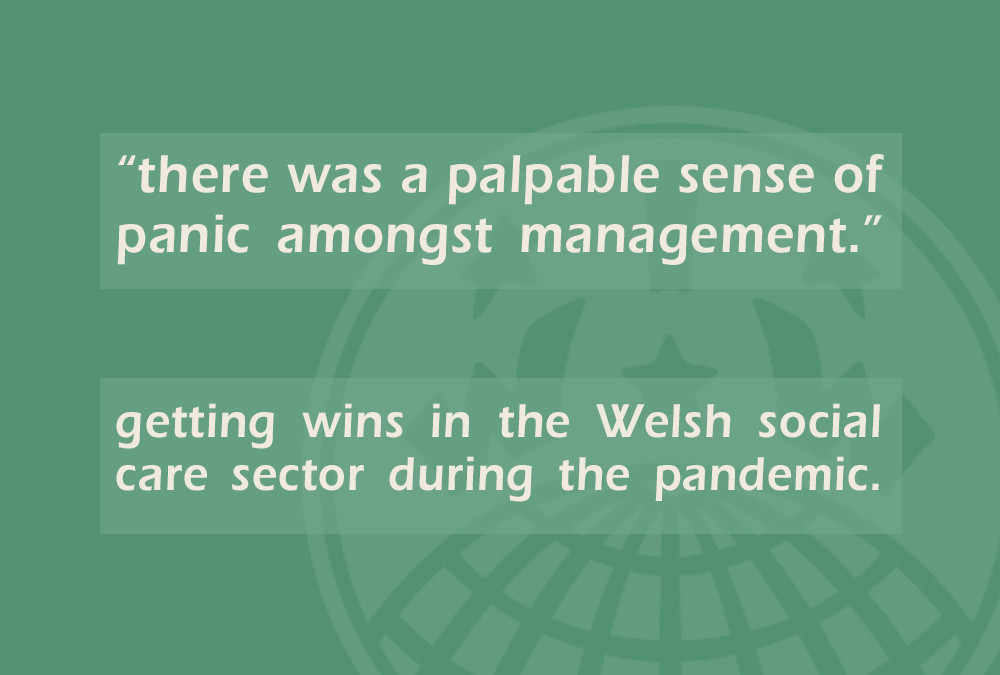The demand for social care and support work is growing across the UK and Ireland, yet the sector is largely non-unionised and exploitation is rampant. Many services and institutions are outsourced to private ‘non-profit’ companies. The following account is from an IWW Cymru member who works in a youth homeless project in South Wales. They describe how Covid-19 has worsened working conditions, but what can be achieved with just a small amount of pressure.
Working in the social care sector I have seen my fair share of management trampling over the rights of employees. Many staff are actually agency workers, as was I a few years back when starting with the company I am with now, and are easily dismissed for the slightest of reasons. Even full-time employees of the “not for profit” “charity” I work for find themselves dismissed easily if they have been with the company for less than two years and haven’t “earned” full employment rights. I work in a unit that is staffed twenty-four hours (usually by a lone member of staff), with four beds for vulnerable young people with housing difficulties. We are often subjected to verbal and physical abuse by the tenants with little or no support from management.
The impact of coronavirus
At the start of the Covid outbreak the management were quite obviously going to do as little as possible to protect staff at the unit. Even when the main office in town was closed and management and floating support workers were told to work from home, the residential support workers were expected to continue without any extra Personal Protective Equipment (PPE) – no masks, gloves or hand gel – or any measures to allow us to distance from the tenants when necessary. This was important as the tenants were not adhering to any social distancing guidelines at all; even at the height of lockdown they would ignore the rules, mixing with various different groups outside the project before returning. This clearly put staff at increased risk of contracting Covid.
Initial concerns put to management were met with what I like to call “flannel.” Just a load of official sounding guff which meant very little at all. Nothing was going to change. Management even suggested that, in order to keep the tenants entertained during lockdown, PS3 gaming sessions should be organised between tenants and staff. When I pointed out that we would all need to cram into a very small living room area to achieve this, making a mockery of the social distancing regulations, I was told I could stand in the doorway if I wanted to! There wasn’t even a coronavirus Risk Assessment for the project, or other projects run by the company.
When the IWW wrote a formal letter raising these concerns, there was a palpable sense of panic amongst management. The plan for gaming sessions was withdrawn immediately. Some PPE was hastily sourced – hilariously some masks were more than ten years out of date! I have no idea what that means for their effectiveness, but still, ten years? – and a flurry of emails issued from someone who had clearly suddenly found the Welsh Government guidelines for managing Covid at work. We were told that it was perfectly acceptable to restrict access to the office for tenants who were not social distancing inside or outside the property. Eventually we received a supply of adequate PPE and a Risk Assessment. Clearly management had no intention of taking these steps before the union got involved.
Twelve hours for the price of eleven!
In my unit, support workers effectively work twelve-hour shifts without a break, but we are only paid for eleven hours. Management is aware that it is illegal to work twelve hours without a break, but they claim that there are plenty of opportunities for us to take a break whilst on the premises throughout our shift. This is sometimes true; there are times when all tenants go out and may not return for several hours. However, there is no way to guarantee this and any break we plan is often interrupted by the tenant returning or needing support, or a professional either phoning or coming to the property seeking help and information. This means we regularly work through our hour-long break for free.
The issue of the unpaid hour had been raised previously by individuals and dismissed by management. But shortly after the success with PPE I decided it might be an idea for the union to have a go at that too. Just as before, there was much to-ing and fro-ing of emails with plenty of the now familiar “flannel” coming from management. It seemed clear that, from the precedent cited by the union, we were at the behest of our employer for the full twelve-hour shift and should be paid accordingly.
We had half a victory on this one. The company conceded that taking breaks can be difficult on a shift and offered £5 to cover the unpaid hour we worked. Whilst confident that they were in the wrong, the rep and I thought it prudent to accept the £5 being offered now, rather than start an arm-wrestle for the remaining £4 with the risk that we might lose and end up with nothing. Not a complete victory, but more than we would have got without the union.
Organising clearly makes a substantial difference to how you are treated by your employer. At the time of all this, not many of my co-workers were IWW members. We still got concessions from management.
Imagine what might be possible if we were all organised?
—
IWW Cymru is hosting an organising meeting for Health & Social Care workers in Wales on Monday 30th November. Find more information here.
